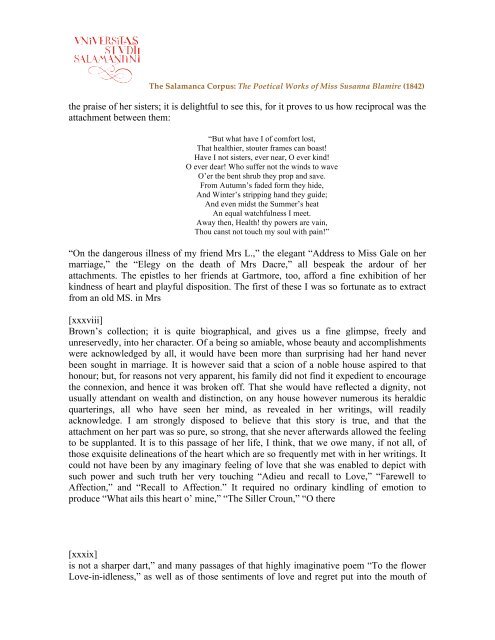The Poetical Works of Miss Susanna Blamire (1842) - Gredos ...
The Poetical Works of Miss Susanna Blamire (1842) - Gredos ...
The Poetical Works of Miss Susanna Blamire (1842) - Gredos ...
Create successful ePaper yourself
Turn your PDF publications into a flip-book with our unique Google optimized e-Paper software.
<strong>The</strong> Salamanca Corpus: <strong>The</strong> <strong>Poetical</strong> <strong>Works</strong> <strong>of</strong> <strong>Miss</strong> <strong>Susanna</strong> <strong>Blamire</strong> (<strong>1842</strong>)<br />
the praise <strong>of</strong> her sisters; it is delightful to see this, for it proves to us how reciprocal was the<br />
attachment between them:<br />
“But what have I <strong>of</strong> comfort lost,<br />
That healthier, stouter frames can boast!<br />
Have I not sisters, ever near, O ever kind!<br />
O ever dear! Who suffer not the winds to wave<br />
O’er the bent shrub they prop and save.<br />
From Autumn’s faded form they hide,<br />
And Winter’s stripping hand they guide;<br />
And even midst the Summer’s heat<br />
An equal watchfulness I meet.<br />
Away then, Health! thy powers are vain,<br />
Thou canst not touch my soul with pain!”<br />
“On the dangerous illness <strong>of</strong> my friend Mrs L.,” the elegant “Address to <strong>Miss</strong> Gale on her<br />
marriage,” the “Elegy on the death <strong>of</strong> Mrs Dacre,” all bespeak the ardour <strong>of</strong> her<br />
attachments. <strong>The</strong> epistles to her friends at Gartmore, too, afford a fine exhibition <strong>of</strong> her<br />
kindness <strong>of</strong> heart and playful disposition. <strong>The</strong> first <strong>of</strong> these I was so fortunate as to extract<br />
from an old MS. in Mrs<br />
[xxxviii]<br />
Brown’s collection; it is quite biographical, and gives us a fine glimpse, freely and<br />
unreservedly, into her character. Of a being so amiable, whose beauty and accomplishments<br />
were acknowledged by all, it would have been more than surprising had her hand never<br />
been sought in marriage. It is however said that a scion <strong>of</strong> a noble house aspired to that<br />
honour; but, for reasons not very apparent, his family did not find it expedient to encourage<br />
the connexion, and hence it was broken <strong>of</strong>f. That she would have reflected a dignity, not<br />
usually attendant on wealth and distinction, on any house however numerous its heraldic<br />
quarterings, all who have seen her mind, as revealed in her writings, will readily<br />
acknowledge. I am strongly disposed to believe that this story is true, and that the<br />
attachment on her part was so pure, so strong, that she never afterwards allowed the feeling<br />
to be supplanted. It is to this passage <strong>of</strong> her life, I think, that we owe many, if not all, <strong>of</strong><br />
those exquisite delineations <strong>of</strong> the heart which are so frequently met with in her writings. It<br />
could not have been by any imaginary feeling <strong>of</strong> love that she was enabled to depict with<br />
such power and such truth her very touching “Adieu and recall to Love,” “Farewell to<br />
Affection,” and “Recall to Affection.” It required no ordinary kindling <strong>of</strong> emotion to<br />
produce “What ails this heart o’ mine,” “<strong>The</strong> Siller Croun,” “O there<br />
[xxxix]<br />
is not a sharper dart,” and many passages <strong>of</strong> that highly imaginative poem “To the flower<br />
Love-in-idleness,” as well as <strong>of</strong> those sentiments <strong>of</strong> love and regret put into the mouth <strong>of</strong>
















